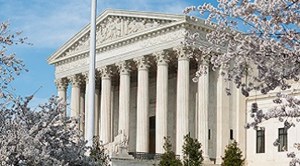Supreme Court appears open to scaling back agency enforcement power
(UC) — On Monday, the Supreme Court looked to be open to expediting agency enforcement proceedings to federal court, E&E News reported.
During back-to-back oral arguments, justices appeared sympathetic to constitutional challenges to the use of in-house administrative law judges to adjudicate conflicts inside the Federal Trade Commission and Securities and Exchange Commission. Opponents argue that the procedure is costly and time-consuming, and that it unjustly favors the agencies.
Challengers argue that they should be able to challenge the process's constitutionality in federal court without waiting for a final agency decision.
“Let me ask a question that — that is simplistic perhaps,” Justice Samuel Alito, a member of the court’s six-justice conservative majority, said in the report. “What sense does it make for a claim that goes to the very structure of the agency having to go through the administrative process?”
Rulings against the SEC and FTC, depending on how broadly they are written, have the potential to limit the enforcement power of other agencies with administrative law judges, such as the EPA, the Interior Department, and the Federal Energy Regulatory Commission — and add to a growing body of case law undermining the so-called administrative state.
The Supreme Court's conservative supermajority has shown an interest in limiting agency authority, most recently in West Virginia v. EPA, which removed one of the federal government's choices for reducing greenhouse gas emissions (Greenwire, June 30).
According to the Office of Personnel Management, the federal government employs over 1,900 administrative law judges. The vast majority of them are employed by the Social Security Administration. Interior has nine, the EPA has three, and FERC has thirteen.
Administrative law judges, for example, oversee examinations of pipeline operators for issues like as spills and groundwater contamination at FERC. Companies have complained that the agency proceedings are unfair, with FERC having a "home court advantage" in enforcement probes (Energywire, May 25).
Gregory Garre, a partner with the firm Latham & Watkins LLP and former solicitor general during the George W. Bush administration, argued on behalf of Michelle Cochran, a certified public accountant who faced allegations that she had violated federal auditing documentation requirements, in the SEC case before the Supreme Court.
Paul Clement, a partner at the boutique legal firm Clement & Murphy PLLC and another Bush-era solicitor general, argued in the FTC case on behalf of Axon Enterprise Inc., a body camera maker that faced an antitrust inquiry when it attempted to purchase a competitor.
Cochran and Axon are both facing administrative law judges at the SEC and the FTC.
Clement compared Axon's case to the Supreme Court's 2012 decision in Sackett v. EPA, which determined that Idaho landowners Michael and Chantell Sackett were entitled to judicial review of an EPA compliance order requiring them to halt construction of their dream home near Priest Lake until they obtained a Clean Water Act permit. This term, the justices will examine Sackett to determine whether the couple requires a permit at all.
The justices are expected to issue their rulings in Axon v. FTC and SEC v. Cochran in the coming months.
Related News
From Archive

- Glenfarne Alaska LNG targets late-2026 construction start for 807-mile pipeline project
- U.S. water reuse boom to fuel $47 billion in infrastructure spending through 2035
- $2.3 billion approved to construct 236-mile Texas-to-Gulf gas pipeline
- Major water pipe break in Puerto Rico hits over 165,000 customers
- Potomac River Tunnel project enters construction phase beneath Washington, D.C.
- Pennsylvania American Water launches interactive map to identify, replace lead water service lines
- Trump's tariffs drive $33 million cost increase for Cincinnati sewer project
- Utah city launches historic $70 million tunnel project using box jacking under active rail line
- Tulsa residents warned after sewer lines damaged by boring work
- Fatal trench collapse halts sewer construction in Massachusetts; two workers hospitalized




Comments